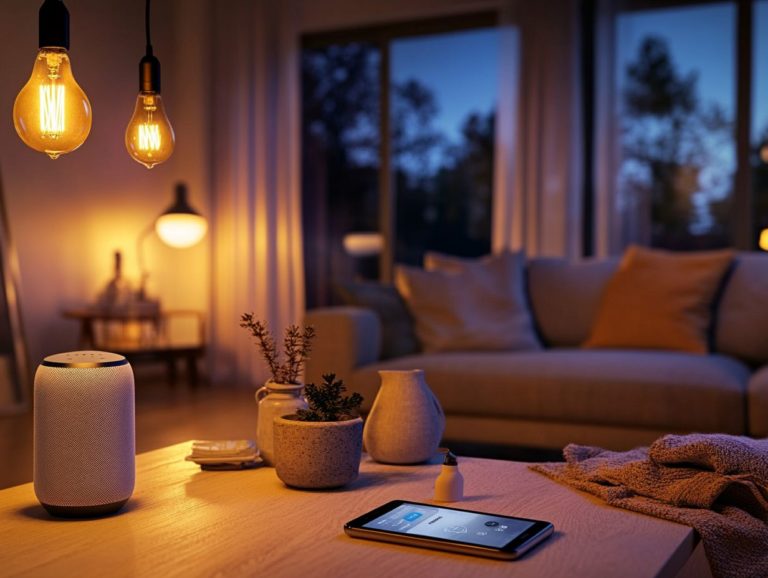How Do I Choose an Energy Auditor?
Are you seeking to cut down on energy costs while enhancing the efficiency of your home or business? Grasping the importance of a professional energy audit is your essential first step.
This article provides a comprehensive guide on hiring an energy auditor, detailing their responsibilities, qualifications, and the potential energy savings they can offer.
Explore the crucial questions you should ask, learn how to prepare for a home energy audit, and discover what to keep in mind when selecting the right professional for your needs.
Delve into the insights shared here to uncover how an energy audit can revolutionize both your space and your finances while improving indoor air quality!
Contents
- Key Takeaways:
- Why Hire an Energy Auditor?
- Benefits and Potential Savings
- Qualifications to Look for in an Energy Auditor
- Questions to Ask Before Hiring an Energy Auditor
- Choosing the Right Energy Auditor for Your Needs
- Costs of Hiring an Energy Auditor
- How to Prepare for an Energy Audit
- Frequently Asked Questions
- How Do I Choose an Energy Auditor?
- What qualifications should I look for in an energy auditor?
- Is it important to choose a local energy auditor?
- What questions should I ask during the initial consultation with an energy auditor?
- Are there any red flags I should watch out for when choosing an energy auditor?
- Can I get a second opinion from another energy auditor?
Key Takeaways:

- Research the qualifications and certifications of an energy auditor before hiring to ensure they have the necessary expertise to accurately assess your energy consumption and make recommendations.
- Ask specific questions about their experience and approach to energy audits to better understand how they will conduct the audit and the potential savings and benefits for your energy-efficient home or business.
- Be prepared for the energy audit by gathering utility bills and making a list of any concerns regarding your appliances. This will help the auditor provide a thorough assessment and recommendations for energy efficiency improvements.
Why Hire an Energy Auditor?
Hire an energy auditor today to unlock significant benefits for homeowners eager to enhance their energy efficiency, lower utility bills, and elevate the comfort of their living spaces. By evaluating your home’s energy consumption and pinpointing specific issues, an energy audit gives you the power to implement targeted solutions that can lead to substantial energy savings, all while supporting a more sustainable lifestyle.
Understanding the Role and Responsibilities
The role of an energy auditor involves a range of responsibilities focused on assessing energy performance and uncovering inefficiencies within a building’s systems, including HVAC equipment and insulation.
Essential tasks include thermal imaging scans, which are special cameras that detect heat loss, followed by a blower door test that checks how airtight your home is. This thorough examination is complemented by analyzing utility bills to discern consumption patterns and discover opportunities for cost savings.
Through these detailed assessments, you provide invaluable insights that not only boost energy efficiency but also help reduce environmental impact and promote sustainable practices in building management.
Benefits and Potential Savings
Hiring an energy auditor offers a wealth of benefits that elevate the comfort of your home and ensure long-term reductions in your utility bills. By pinpointing inefficiencies in your heating and cooling systems, an energy audit can yield substantial savings on your monthly energy expenses.
You may discover that enhancing your HVAC efficiency not only reduces your carbon footprint but significantly improves your overall comfort levels. The auditor will typically suggest upgrades to insulation, which helps maintain consistent indoor temperatures, allowing you to enjoy a cozier living space while minimizing drafts and reliance on heating and cooling systems.
Ultimately, investing in an energy audit sets the stage for both financial savings and a more enjoyable living environment.
Don t wait! Schedule your energy audit today to start saving money and improving your home.
Qualifications to Look for in an Energy Auditor

When selecting an energy auditor, carefully evaluate their qualifications. Look for relevant certifications and their level of experience to ensure that your energy audit meets industry standards.
Seek professionals certified by reputable organizations, such as the Energy Efficient Building Association. Make sure they have practical experience in conducting comprehensive energy assessments across various building types. For those interested in a more hands-on approach, learning how to conduct your own energy audit can be beneficial. Your choice will reflect the quality and reliability of the audit you receive.
Certifications and Experience
Certifications play an essential role in validating an energy auditor’s expertise. They reflect proficiency in implementing energy efficiency improvements.
For instance, the Certified Energy Manager (CEM) certification demonstrates a strong understanding of energy management principles. It helps pinpoint key areas for efficiency enhancements. The Home Energy Rating System (HERS) certification provides a comprehensive framework for evaluating residential properties, ensuring energy ratings are accurate and actionable.
Combined, these certifications empower auditors to deliver tailored solutions that can significantly reduce energy consumption and costs for clients while fostering sustainable practices.
Questions to Ask Before Hiring an Energy Auditor
Before hiring an energy auditor, ask key questions to evaluate their qualifications, methods, and potential advantages of the energy audit.
Inquire about their experience with specific types of audits and their approach to uncovering energy issues. Check their familiarity with local utility companies. These questions provide valuable insights into their expertise and help you make an informed decision about how to choose an energy efficient home.
Key Inquiries to Make
Make sure to ask questions about their methodologies and the tools they use for assessments. Inquire about success stories from previous clients. Understanding their approach can significantly influence the audit’s effectiveness.
For example, ask whether the auditor utilizes thermal imaging to identify insulation gaps or air leaks. This technique highlights temperature differences in walls and ceilings, giving you a clear view of where energy loss occurs. Also, ask about blower door tests to find out how airtight your building is and to quantify air leakage.
By employing these tools, the auditor boosts the accuracy of the audit and offers actionable recommendations to enhance energy efficiency and overall comfort.
Choosing the Right Energy Auditor for Your Needs
Selecting the ideal energy auditor for your requirements requires careful evaluation of various factors that impact the effectiveness of your energy audit and the resulting efficiency improvements.
Consider essential elements such as the auditor’s experience, relevant certifications, methodological approach, and client testimonials. Take these factors into account now to ensure you make the right choice!
Factors to Consider

When selecting an energy auditor, several factors warrant your careful consideration to ensure you achieve optimal energy efficiency improvements tailored to your unique needs.
The auditor’s methodology in evaluating energy performance is vital for pinpointing areas ripe for enhancement, especially regarding air leakage and insulation. Their access to advanced diagnostic tools, such as thermal imaging (a method to see temperature differences) and energy modeling software, allows for more precise assessments.
An auditor’s familiarity with local energy incentives is crucial. This knowledge gives them the power to recommend specific improvements, such as upgrading insulation or implementing smart lighting solutions, that can help you take full advantage of these financial benefits.
By blending technical expertise with an understanding of local resources, a skilled energy auditor can significantly contribute to your cost savings and sustainability goals.
Costs of Hiring an Energy Auditor
Grasping the costs tied to hiring an energy auditor is essential for homeowners intent on enhancing their energy performance while keeping a close eye on their budgets and utility bills. Prices can fluctuate based on the complexity of the audit, the size of your property, and the specific services offered, such as thermal imaging or air leakage testing.
Understanding these factors empowers you to make informed decisions that align with both your energy efficiency goals and financial plans. Both basic assessments and comprehensive evaluations can considerably affect overall costs, typically falling anywhere from a few hundred to several thousand dollars.
Basic audits might provide a straightforward overview of energy usage, while in-depth evaluations take a deeper dive into your building’s systems and insulation. These investments often align closely with potential energy savings; a thorough audit can uncover numerous inefficiencies, ultimately leading to substantial reductions in your energy bills over time.
While the initial costs may seem steep, it s important to recognize that the long-term financial benefits and enhancements in comfort can often outweigh the initial outlay.
How to Prepare for an Energy Audit
Preparing for an energy audit requires a strategic approach that can significantly boost both the efficiency and effectiveness of the assessment. Make sure the auditor has full access to all relevant areas of your home.
It’s wise to compile a comprehensive list of past utility bills to provide valuable insights. Additionally, take note of any existing energy issues or concerns regarding heating, cooling, and insulation. This proactive preparation will set the stage for a thorough and beneficial audit.
Steps to Take Before the Audit
Taking the right steps before an energy audit can greatly enhance the quality and outcomes of your assessment, ensuring that all energy efficiency concerns are thoroughly addressed. By preparing properly, you create an environment that allows the auditor to conduct a comprehensive evaluation.
This means securing areas of your home that need inspection, such as attics, basements, and crawl spaces, to facilitate unobstructed access for a meticulous analysis. Gathering your recent energy bills is essential, as they offer valuable insights into your consumption patterns over time.
Additionally, take a moment to note any apparent energy issues, like drafts or uneven heating; these observations can help guide the auditor toward specific problems that may need immediate attention. For more detailed guidance, consider reviewing how to conduct a home energy audit. These preparatory steps not only streamline the audit process but also make it more efficient and effective, paving the way for improved energy performance in your home.
Frequently Asked Questions

Ready to boost your home s energy efficiency? Schedule your audit today!
How Do I Choose an Energy Auditor?
Choosing an energy auditor doesn t have to be hard! Here are some tips to help you.
What qualifications should I look for in an energy auditor?
Look for a certified energy auditor. Certifications from trustworthy organizations ensure they have the right training.
For example, the Building Performance Institute and the Residential Energy Services Network are reputable organizations.
Is it important to choose a local energy auditor?
It’s best to choose a local energy auditor. They understand the climate and building codes specific to your area.
They often have experience working with local utility companies and can offer accurate energy-saving recommendations.
What questions should I ask during the initial consultation with an energy auditor?
During your first meeting, ask about their experience and certifications. It’s also important to inquire about costs, timelines, and any follow-up services.
Are there any red flags I should watch out for when choosing an energy auditor?
Watch for auditors who promise a one-size-fits-all solution. Your home is unique and needs a tailored approach.
Be cautious of those who suggest costly upgrades without a thorough explanation or a complete energy audit.
Can I get a second opinion from another energy auditor?
Absolutely! Getting a second opinion is smart. It helps you compare options and ensures you’re making the best choice for your home and budget.






